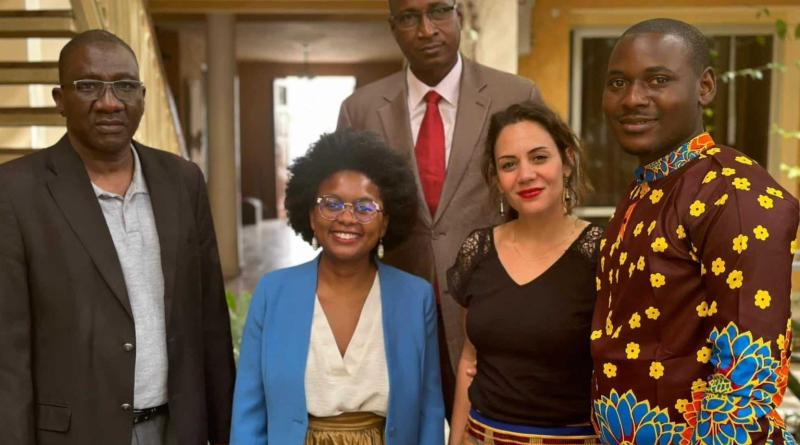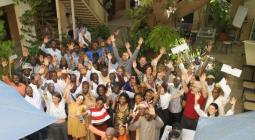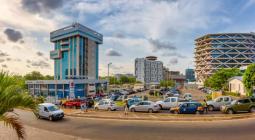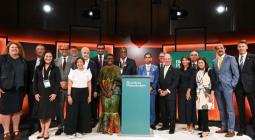In Saint-Louis, the Mavil Forum advocates the sustainability of intermediate cities

For three days, several nationalities from sub-Saharan Africa and Europe live together in the city of Saint-Louis in Senegal. This is on the occasion of a Forum on intermediate cities organized by the Mastery and adaptation of intermediate cities in the Sahel (Mavil) program coordinated by the Frenchwoman Zoé Vauquelin. In this cross-interview granted to AFRIK 21, she discusses the current and future challenges of the Sahel territories, alongside Issagha Diagana, academic and urban planning advisor to the Prime Minister of Mauritania, Séga Sow, inspector of local finances of the city de Kayes at the Mauritanian Ministry of Territorial Administration and Decentralization, as well as Taman Mhoumadi, young Franco-Comorian artist and trainer in climate issues.
For three days, several nationalities from sub-Saharan Africa and Europe live together in the city of Saint-Louis in Senegal. This is on the occasion of a Forum on intermediate cities organized by the Mastery and adaptation of intermediate cities in the Sahel (Mavil) program coordinated by the Frenchwoman Zoé Vauquelin. In this cross-interview granted to AFRIK 21, she discusses the current and future challenges of the Sahel territories, alongside Issagha Diagana, academic and urban planning advisor to the Prime Minister of Mauritania, Séga Sow, inspector of local finances of the city de Kayes at the Mauritanian Ministry of Territorial Administration and Decentralization, as well as Taman Mhoumadi, young Franco-Comorian artist and trainer in climate issues.
Benoit-Ivan Wansi: The Forum “What trajectories for the cities of the Senegal River? Regards sur Kayes au Mali, Kaédi en Mauritania et Bakel au Senegal” opened yesterday December 12, 2023 in the Senegalese city of Saint-Louis with more than 70 participants coming mainly from Africa and Europe. What is special about this event?
Zoé Vauquelin: The idea of this forum is to mark a milestone for the Control and Adaptation of Intermediate Cities in the Sahel (Mavil) program which is planned to last 10 years. Its vocation is determined by the international association GRDR Migrations-Citizenship-Development (based in France). This involves bringing together local authorities and civil society from Senegal, Mali and Mauritania around the challenges of urban transition in the Senegal River basin.
How would you describe in a few words the face of Mauritanian cities?
Issagha Diagana: Mauritania is a country populated by more than 4.5 million inhabitants with a population dispersed throughout the national territory. Cities which are confronted with natural phenomena which weigh a little on urban organization. In forty years, we have gone from a nomadic country to an urban country thanks to a national sedentarization program. Urbanization has been rapid and is 60% today. And the capital Nouakchott, which has an extraordinary past, has evolved very quickly in recent years and now competes on certain aspects of development with others African cities.
The town of Kayes in Mali has at least 150,000 inhabitants. How do we manage such a population between armed conflicts at the national level and prolonged drought which of course rhymes with water scarcity and low agricultural productivity?
Séga Sow: Since 2012, Mali has been plagued by insecurity which has started from the North and is moving towards the center. The town of Kayes (in the west) is spared from these armed conflicts for the moment. With the political transition, the country is in the process of territorial reorganization, notably with the creation of 11 new regions and a special status granted to the capital Bamako. Concerning the old region of Kayes, it has broken up into three new subdivisions. The main urban challenge since 1965 has been the migration of people. In this regard, the “Kayésiens” represent up to 80% of the Malian diaspora in France.
Nowadays, this community has become the driving force of the local economy of Kayes (development of large diameter wells for water supply, construction of schools and health centers). At our level, as support services, we work to boost economic growth in terms of supporting local authorities, particularly by promoting sustainable agriculture with the potential of the Senegal River.
From access to water and energy, through transport, sanitation and housing infrastructure. In your opinion, which of these basic services do the populations of intermediate cities need the most currently?
Taman Mhoumadi: Water. I worked for the start-up Majik Water which produces water from the air in Kenya. At the time, we went to meet local communities to see how the development of our solution could serve them. Indeed, these inhabitants had the habit of traveling a long distance to obtain supplies and when the resource became scarce, they began to fight. This means that the urgency of investing in the sixth Sustainable Development Goal (SDG6) is very real. We need innovative and adapted solutions.
In two years of existence, are there specific projects and investments on the SDGs that the Mavil program has carried out in intermediate cities?
Zoé Vauquelin: The GRDR has been working alongside the cities of the Sahel for 30 years, precisely in the aspects of institutional support, decentralization, questions of economic development and migration but also adaptation to climate change. With the Mavil program, we have set ourselves the mission of developing welcoming, attractive and resilient cities. For example, we have worked on the integrated management of water resources, particularly between the cross-border cities of Senegal and Mauritania.
With the Abbé Pierre humanitarian foundation, we also contributed to post-flood reconstruction and the promotion of sustainable housing by taking climate risks into account in the construction of housing in the Mauritanian commune of Kaédi. We have continued in this same vein for several months with the launch of an integrated household waste management initiative in the commune of Sélibabi in Mauritania.
Nearly 250 mayors from Africa participated in the 28e United Nations Climate Conference (COP28) which took place closed on December 12, 2023 and where they managed to raise $467 million from foundations and international donors. Is this approach the best way to finance intermediate cities on the continent?
Issagha Diagana : Our communities did not wait for the COP to fight against the effects of climate change which is hitting them hard. This is a long-standing fight for the municipalities of Bakel, Kayes and Kaedi. We must be able to free up capital, especially not relying on external financing. Our countries are rich with enormous natural potential and brave men, fertile lands and abundant water (Senegal River) on which we should rely rather than on resources promised during climate negotiations, most of which do not never come to fruition.
Should we reconcile ancestral knowledge and new technologies to be able to preserve the environment in urban areas?
Séga Sow: Certainly we must develop new technologies but taking into account the basic elements of territorial development. The priority for our communities is to have good urban planning tools. Five years ago, Mali adopted a law for the restitution of public funds from the administrative accounts of communities (elected officials report to the populations) which is not yet effective. We therefore have existing approaches that need to be improved. On the sustainability side, Malian cities have begun their energy transition by gradually turning away from thermal power plants in favor of solar panels thanks to the natural sunshine of the Sahelian zone. In the building sector, there is a collective awareness of the need to turn our back on concrete and cement in favor of local construction materials. It is in this logic that we train the young people of Kayes in the manufacture of compressed earth bricks (BTC). This technique helps combat extreme heat. In my opinion, technology has put us a little behind, especially because Africans just want to copy what is done in the West without adapting to the local context.
Do you share this opinion? And what precise role do "repatriates" - such as you who lived in France before settling down in Dakar, play a role in achieving the sustainable development of their cities of origin?
Taman Mhoumadi: Not at all. Ancestral knowledge and technologies are not contradictory. Absolutely ! “Repats” have a will, a connection and an energy to reconnect with their origins and their experiences acquired in their host countries can motivate decision-making focused on sustainability. They are also an asset for the training of young people and more broadly I invite leaders to involve artists where grand speeches no longer work.
If you had enough funds at your disposal, what would be your priority in terms of green projects (solar power plant, waste recycling plant, deployment of electric vehicles, planting of green spaces.)? And why?
Issagha Diagana : I would say “solar power plant” without hesitation. This allows young entrepreneurs to set up business and households to manage the domestic economy. For example, the poor are the ones who spend the most because they buy in fractions and have no means of preserving their food. Energy is therefore the key to the development of any urban area.
Can decentralized cooperation allow Mali’s cities to respond effectively to their economic and climatic challenges?
Séga Sow: The Kayes region is in close collaboration with the towns of the Ile de France and Nord-Pas-de-Calais regions in France. This cooperation, which began with twinning thanks to initiatives by our migrants, is already bearing fruit, particularly in terms of transfer of skills and technical expertise. I also add that the media have their part to play in reporting on inadequacies and popularizing progress. So, we are currently working on setting up community radio stations, particularly in Kayes.
What's next after this three-day Forum?
Zoé Vauquelin: We will continue to support the urban transition in intermediate cities by producing reliable data, strengthening the capacities of local stakeholders, and improving access essential services (water, sanitation, etc.). We will also co-build a network of sustainable and inclusive cities that involve young people, women and all other categories of civil society.
Comments collected by Benoit-Ivan Wansi, special correspondent in Saint-Louis





